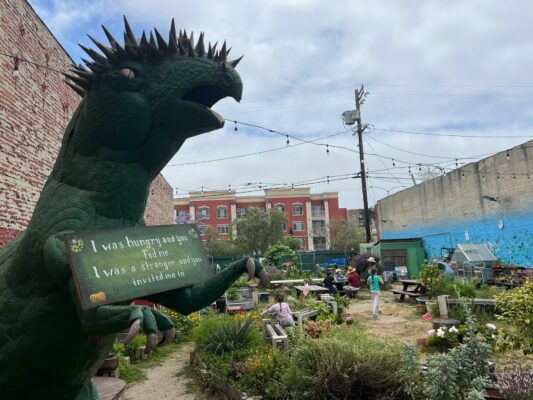
The city council unanimously rejected a downtown property owner’s request to temporarily change the zoned use of his restaurant space to retail on Mar. 4.
It was the first time a business applied for a change of use under a hardship exemption since the city enacted its temporary freeze on downtown business use last July.
The case encapsulates the city’s struggle to control the future of its downtown as rents inflate, pushing out small businesses. In response to fears over downtown’s rapid changes, the council passed and then extended an ordinance that prohibits businesses from changing their zoned uses through this July as a quick fix while drawing up a longterm plan. In January, the nonprofit urban planning organization Urban Land Institute gave the city some recommendations. Last month, the city hired the consultant Pacific Municipal Consultants to draft a plan.
Property owner Ron Koch said it was the first time he’d had a vacancy in his building at the corner of Highland Avenue and Center Place since 1991, when he acquired it. The 5,600-square feet space currently houses the newspaper stand Current Events, an auto repair shop and a restaurant space on the ground floor, and two office spaces on the top floor. For Koch, who is retired, and his wife Cathy, the building is the only source of income, he told the council.
“I’ve never lost a month’s rent up until this month,” he said. “This is my retirement program. It’s a major chunk of our income.”
A series of restaurants have passed through the space most recently occupied by the F-Grill, which vacated when its lease ended on Dec. 31. Koch said that these restaurants didn’t go out of business, but rather were bought out. However, he believes the 935-square feet space is too small for a restaurant. City Planning Manager Laurie Jester appeared to agree, saying, “It is a very small space for a restaurant.”
Koch also operates the small auto shop that opens on the alley on Center Place. When he mentioned this to the city council, the council expressed surprise that such a shop existed in downtown Manhattan Beach. Koch agreed that such a use was out of date for the downtown.
“The auto shop is the 600-pound gorilla,” said Koch. “You don’t want it. As a property owner, I get to sit with 2,500 square feet I can’t do anything with.”
Koch applied to have the space rezoned as a restaurant in November, hoping to add it to the current restaurant space. The city’s planning staff advised him not to, however, because of difficulties with switching the use. A restaurant would require more parking, Jester said, which the property doesn’t have.
Koch hopes to sell the building, and so he doesn’t want to start a lease with a new longterm restaurant tenant, he said. When the owner of a pop-up jewelry shop asked about renting the space for six months, Koch applied to temporarily change the use of the restaurant space to retail under a hardship exemption built into the city’s freeze on business use. It was the first time a business applied for a change of use under the exemption, Jester said.
The ordinance states, “The City Council shall grant a hardship exemption upon making a finding that denial of the exemption and enforcement of this Ordinance against the applicant’s property would result in the applicant being deprived of all economically viable use of this property. The City Council may consider other factors in order to determine hardship.”
Jester also said that if it were not for the moratorium, the process would require a building permit and a “very simple plan check.”
As per the ordinance, Koch’s request came directly to the city council. The council was initially torn over whether to grant his request. Councilmember Tony D’Errico expressed some of the issues they grappled with.
“On the one hand, it sounds very reasonable,” said D’Errico. On the other, he said, he was afraid of setting a precedent. He mentioned the space currently occupied by Simmzy’s on Manhattan Beach Boulevard, which had a series of failed restaurants until its current “homerun.”
“From a city downtown point of view, I think we’d rather have a viable business in this location than nothing,” continued D’Errico. But, he said, “I don’t know that I completely classify this as a financial hardship. If I see that it’s not a hardship but it makes common sense, can I approve it?”
City Attorney Quinn Barrow said that while there was some hardship involved, it would be a “stronger case” if Koch only had the restaurant.
“It’s clearly not a situation where the owner is deprived of all potential economic use,” said Barrow. However, he said, “There is some hardship here — it’s vacant.”
Councilmember Amy Howorth didn’t think the situation met the requirement laid out in the exemption.
“I hear us all trying to make this work,” she said. “Here’s the problem: We’re looking at a hardship definition. I think we’re creating a lot of complexities with the potential of this backfiring on us. To me, hardship is long-vacant stores because the use just doesn’t make sense anymore. This is the first [exemption request] to come before us. We’re going to get more of these coming before us.”
“I cannot rule on hardship,” she concluded. But, she said, “That doesn’t mean I can’t see the common sense.”
She convinced Councilmember Mark Burton, who said he had been “leaning the other way” until he heard her argument.
As the council appeared to be gearing up to rule against his request, Koch tried to convince them that it was indeed a hardship.
“The restaurant represents 50 percent of my income from the building,” he said. “You wouldn’t want to lose 50 percent of your income. That’s the business I’m in — property rental. I’m losing 50 percent of the income from my business.”
He also suggested that their denial would be bad for the city.
“Am I not going to be allowed to change the auto to retail that generates tax revenue for the city?” he asked. “It’s easy to call a timeout,” he continued. “You’re calling a timeout on my business. It’s a hard thing for me to swallow. This is my sole source of income.”
Councilmember David Lesser, who initially wondered if the city was “forcing a landowner” to use his property in a way that didn’t make sense, questioned if Koch had made a “sufficient effort” to find another tenant. Lesser said he was becoming “increasingly reluctant” to grant the exemption.
Mayor Wayne Powell said that he doubted they would have a plan for the downtown in a year and could see the freeze continuing. According to the city attorney, however, they could only extend the freeze for one more year after July.
Howorth made the motion to deny Koch’s request, which was seconded by Burton. It was ultimately denied by the entire council. ER










